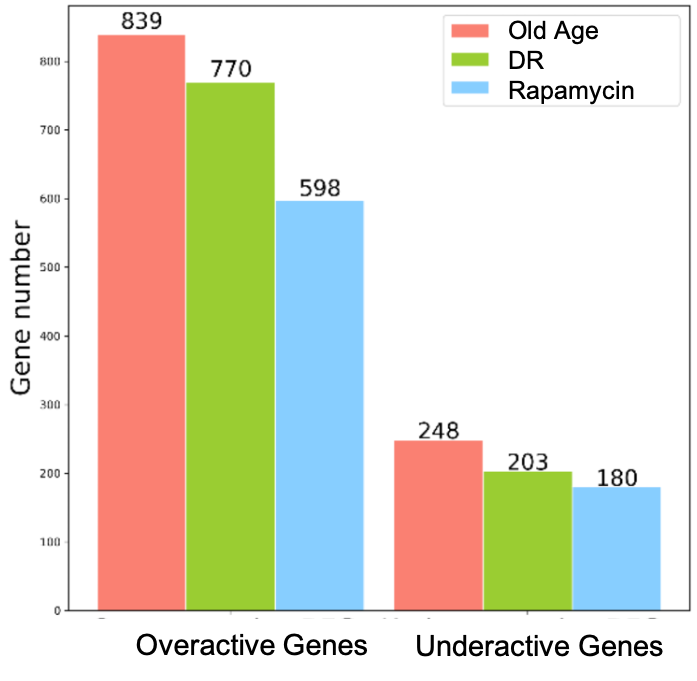Key Points:
- Aging leads to changes in gene activation linked to brain function in the hippocampus of mice.
- Rapamycin restores 69.5% of the same age-associated gene changes as dietary restriction.
- Dietary restriction restores more age-associated genes than rapamycin.
For those of us who wish to live longer, the two most powerful methods for extending lifespan could be dietary restriction — eating fewer calories without malnourishment —and rapamycin. Rapamycin — a drug that inhibits the mTOR nutrient signaling pathway — has been called a mimic of dietary restriction as it also inhibits mTOR. While previous studies suggest the contrary, a new study shows this could be somewhat true for the hippocampus — the learning and memory gateway of the brain.
In the journal Genes, Yin and colleagues from Northwestern Polytechnic University in China identify changes in gene activation that occur with the aging mouse hippocampus. With considerable overlap, these age-associated gene changes, many related to neural function, are restored by dietary restriction or rapamycin. Furthermore, dietary restriction and rapamycin similarly restore another feature of molecular aging called DNA methylation.
Dietary Restriction and Rapamycin Restore Age-Associated Gene Changes
By comparing young and old mice, Yin and colleagues identified underactive and overactive genes associated with aging in the hippocampus. The underactive genes tended to be related to cognitive and brain function, while the overactive genes were linked to non-brain function. Dietary restriction and rapamycin increased about 71% of the same underactive genes and decreased about 64% of the same overactive genes. Of all the age-associated genes, about 70% overlapped, demonstrating similar effects of dietary restriction and rapamycin on age-associated gene restoration.

The above results suggest that dietary restriction and rapamycin treatment slow down age-associated brain degeneration. In this study, the restoration of age-associated genes was observed in the hippocampus. In humans, the deterioration of the hippocampus that occurs with aging is linked to cognitive decline and, if severe enough, can lead to dementia. Therefore, it is possible that dietary restriction and rapamycin can slow down cognitive decline by changing the activation patterns of specific genes in the hippocampus.
Yin and colleagues found that dietary restriction restored more age-associated genes than rapamycin. Dietary restriction restored about 90% of the age-associated gene changes, while rapamycin restored about 72%. These results reveal that while there is a significant overlap in gene restoration between dietary restriction and rapamycin, rapamycin does not entirely mimic dietary restriction in the hippocampus of older mice.

The slowing down of aging at the molecular level may underlie the mitigation of age-related diseases. A molecular phenomenon known as DNA methylation (and other epigenetic modifications) is considered to be at the interface between environmental factors and genetic inheritance. Aging causes changes in DNA methylation, promoting changes in gene activation that play a role in cognitive decline. Yin and colleagues found that both dietary restriction and rapamycin restored age-associated changes in DNA methylation in the mouse hippocampus. These results indicate that gene activation and DNA methylation may act together to influence brain aging.
Other studies have shown that molecular factors like DNA methylation potentially control the changes in gene activation patterns that cause brain aging and age-related neurodegenerative disorders, such as Alzheimer’s disease. The findings of Yin and colleagues suggest that dietary restriction and rapamycin can prevent age-associated changes in DNA methylation and gene activation, thus preventing cognitive decline and neurodegeneration.
Dietary Restriction, Rapamycin, or Both?
In a review article, Unnikrishnan and colleagues “predict that a combination of dietary restriction and rapamycin will have a greater effect on lifespan/aging than either dietary restriction or rapamycin alone.” This prediction is mainly based on a study in fruit flies showing that rapamycin combined with dietary restriction results in a greater increase in lifespan than either alone. Harvard scientist Dr. David Sinclair describes a few ways of going about dietary restriction and touches on rapamycin in one of his podcasts.
As for mitigating cognitive decline, there is evidence for both rapamycin and dietary restriction improving learning and memory. Both methods act on mTOR, associated with a gene linked to better memory performance (FASTKD2) in older adults. Still, the complexities of mTOR and how it is activated in different organs by dietary restriction and rapamycin need to be worked out. For example, inhibiting mTOR promotes healthy aging by allowing for autophagy — the system used by cells to clear unwanted material. In contrast, increasing mTOR promotes neurogenesis, which is important for learning and memory. Therefore, it is unclear how rapamycin and dietary restriction, which both inhibit mTOR, improve learning and memory.